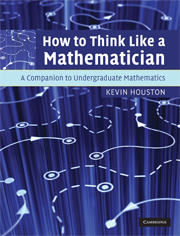Book contents
- Frontmatter
- Contents
- Preface
- I Study skills for mathematicians
- II How to think logically
- III Definitions, theorems and proofs
- IV Techniques of proof
- V Mathematics that all good mathematicians need
- 27 Divisors
- 28 The Euclidean Algorithm
- 29 Modular arithmetic
- 30 Injective, surjective, bijective – and a bit about infinity
- 31 Equivalence relations
- VI Closing remarks
- Appendices
- Index
31 - Equivalence relations
from V - Mathematics that all good mathematicians need
- Frontmatter
- Contents
- Preface
- I Study skills for mathematicians
- II How to think logically
- III Definitions, theorems and proofs
- IV Techniques of proof
- V Mathematics that all good mathematicians need
- 27 Divisors
- 28 The Euclidean Algorithm
- 29 Modular arithmetic
- 30 Injective, surjective, bijective – and a bit about infinity
- 31 Equivalence relations
- VI Closing remarks
- Appendices
- Index
Summary
All animals are equal, but some animals are more equal than others.
George Orwell, Animal Farm, 1946In this chapter we see how mathematics becomes abstracted, that is, we identify some property that we like from an example and then make a general definition that covers this example but also allows us to investigate a far wider group of objects. In Chapter 29, Modular arithmetic, we took the idea that two numbers were equivalent if they had the same remainder on division by n. Now we are going to abstract the whole notion of what it means to be equivalent. We will call this an equivalence relation. As an example, in a standard deck of playing cards we can say that two cards are equivalent if they have the same suit, or we can say that they are equivalent if they have the same value.
The concept of equivalence relation is hard to grasp as it is unlike any other met in lower-level mathematics. A particular sticking point is the notion of equivalence class. This is where we gather together all the equivalent elements and treat them as a single entity. For example, if we declare two cards equivalent if they have the same suit, then the equivalence class of the seven of Spades consists of all the Spades. If we take the equivalence relation to be that cards are equivalent if they have the same value, then the equivalence class of the seven of Spades is all the sevens: {seven of Spades, seven of Hearts, seven of Clubs, seven of Diamonds}.
- Type
- Chapter
- Information
- How to Think Like a MathematicianA Companion to Undergraduate Mathematics, pp. 230 - 240Publisher: Cambridge University PressPrint publication year: 2009



